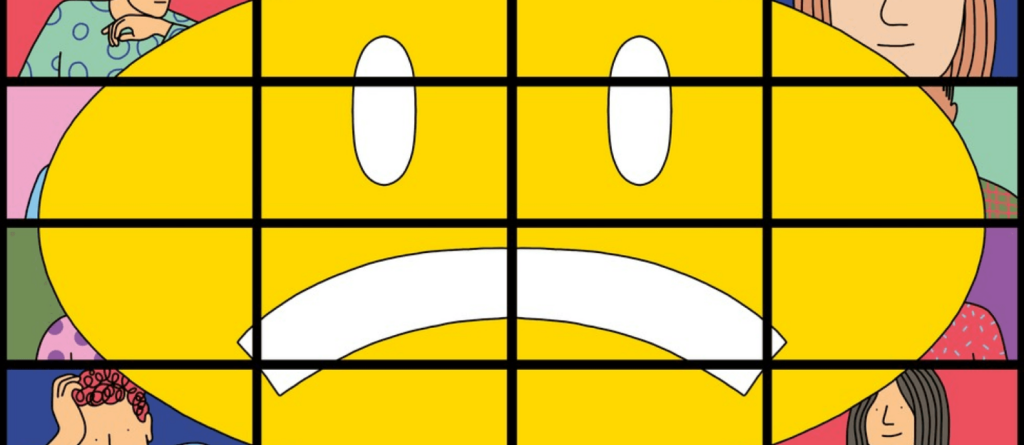- |
- |

Change is everywhere. Some of us fight for it and others fight against it. Some see it as something that is good; others as a phenomenon to resist. Or, perhaps it has no meaning at all.
Regardless of our relationship with change, we must prepare for its inevitable arrival. Acceptance is key. As Marcus Aurilius wrote, “Loss is nothing as but change, and change is Nature’s delight.”
So, we lightly bundle these eight articles up for you with the thread of change. Whether it is the role of emotion in an organisation confronted by transformation, or how advances in television technology is change how we view film, or how video conferencing is changing how we connect with our teammates; Daniel Banik’s choices are designed to help you think about how change infiltrates our lives.
1. Organisational transformation is an emotional journey.

- Read the full article here.
- Created by: Andrew White.
- Contributed by: Sarah El-Atm.
Changing at an individual level is hard. Driving change through an entire organisation is near impossible. In this article from HBR Blog, the authors explore the role of emotion in organisational change, especially in gaining commitment from the teams driving the change. It also recognises an often-overlooked element of the transformation process: those people who bear the emotional brunt of transformations that fail. This article will be a helpful read to any leader looking to take their team into uncharted territories.
2. TVs are too good now. Why does Home Alone look better than the latest Marvel fare on the most advanced displays?

- Read the full article here.
- Created by: Lane Brown.
- Contributed by: James Otter.
There was a time—not too long ago—when TVs were big, brown and, occupied the corner of the family room. By comparison, today’s technology is utterly astounding in its design and picture quality. As someone who does not own a television, this article was a complete revelation for me. It is a wonderful demonstration of how advances in television technology highlight how far CGI has to go to catch the intricate details conveyed in film.
3. Humans have always been wrong about humans.

- Read the full article here.
- Created by: Virginia Heffernan.
- Contributed by: Zoe Warne.
Full disclosure: I had never heard of a single person mentioned in this article before reading it. In fact, many of the ideas, concepts, and civilizations were completely novel to me. But that’s what I love about this article/review/account. It was like walking through a library and ignoring the ‘do not enter’ sign on that room full of books. It has opened a world of academia that I am now keen to explore and understand. Hopefully this article has the same effect on you.
4. The trouble with zooming forever.

- Read the full article here.
- Written by: Arthur C Brooks.
- Contributed by: Seb Griffiths.
The world changed with the arrival of COVID-19 in ways that will keep academics writing PhD theses for decades to come. One of the major changes was how we view the work environment, particularly its location. This was enabled by the readiness and availability of video conferencing technologies like Zoom and Microsoft Teams. In this article, Arthur C Brooks ponders what we might have lost by the gaining the ability to work from wherever we like.
5. The case for caring less.

- Read the full article here.
- Written by: Allie Volpe.
- Contributed by: Maikel Daloo.
Turns out the throwaway line ‘don’t sweat the small stuff’ carries some weight. In this article from Vox, Allie Volpe explains the importance of centering yourself and setting boundaries to protect – and nurture – your piece of mind, and explains the quality this adds to your day-to-day life. Oh, and reminds us that there is no need to feel guilty for aiming for good enough rather than perfect.
6. The hidden history of screen readers.

- Read the full article here.
- Written by: Sheon Han.
- Contributed by: Timocles Copland.
In this article for The Verge, Sheon Han sheds light on the life-changing software created by programmers with blindness. For one thing, you’ll certainly have a newfound understanding—and appreciation—for those voiceover pop-ups next time you inadvertently press a certain combination of keys on your keyboard.
7. Your other life.

- Watch the music video here.
- Created by: Lord Huron.
- Contributed by: Bridget Noonan.
Lord Huron’s interactive music video for ‘Your Other Life’ toys with the concept of living a double life. After pressing play, you’ll notice a fader scale that allows you to slide between dimensions, representing two perspectives of the same event depicted in the video. Curious to know how events unfold? Our lips are sealed. Be sure to give it a watch to find out.
8. Apple is already dying, and this process has a name.

- Read the full article here.
- Created by: Alan Trapulionis.
- Contributed by: Vince Raffaut.
Apple benefited greatly from Job’s custom-made, handheld company structure. However, it is also precisely what has led the company to its inevitable demise.
In this article from Medium, Alan Trapulionis explores Apple’s decline in innovation since Jobs’ passing. In this unbiased analysis, you’ll learn why we can’t point the finger at their CEO, Tim Cook, either. A fascinating read that will make you think harder next time you’re in the market for some new tech.
More Articles
Up for some more?
Get your monthly fix of August happenings and our curated Super8 delivered straight to your inbox.
Thanks for signing up.
Stay tuned, the next one isn't far away.
Return to the blog.
